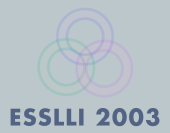The World Wide Web has been made possible through a set of widely
established standards which guarantee interoperability at various
levels: the TCP/IP protocol has ensured that nobody has to worry about
transporting bits over the wire anymore; similarly, HTTP and HTML have
provided a standard way of retrieving and presenting hyperlinked text
documents. Applications were able to use this common infrastructure
and this has led to the WWW as we know it now.
Currently, work is underway to develop a standard ontology language
for use on the WWW. This language, called OWL, is intended to be used
in meta-data annotations that describe the content and functionality
of web accessible resources, making them more accessible to automated
processes, and thus providing a basic building block for the so called
"Semantic Web". OWL is based on DAML+OIL, a web ontology language that
is itself based on a very expressive Description Logic, but which also
tries to maintain maximal syntactic and semantic compatibility with
RDF, an existing standard annotation language. The attempt to maintain
compatibility with RDF has caused some serious problems as RDF has a
non-standard model theory based on ideas from KIF.
In this course we will introduce the semantic web and the role played
by ontology languages. We will motivate the use of a (description)
logic based language and study DAML+OIL/OWL in detail. We will also
discuss the relationship of DAML+OIL/OWL with existing standards, in
particular RDF, and the problems caused by this so called "semantic
layering".
In more detail, the topics covered in the course will include:
* Introduction to the Semantic Web and the use of ontologies
* Existing web languages, in particular RDF
- syntax and semantics
* OIL, DAML+OIL and OWL
- syntax and semantics
- relationship to RDF
- relationship to description logics
* Reasoning with OIL, DAML+OIL and OWL
- useful standard reasoning services in SW context
- reasoning problems, algorithms, and their implementation
- tool demonstrations
* Challenges and problems
- supporting full OWL
- scalability
- further (non-standard) reasoning services to fully support
design, usage, evolution, integration, and interoperation
of ontologies
|

 Print this
page
Print this
page 